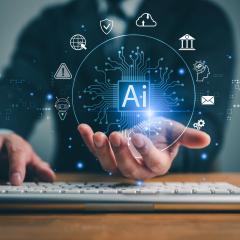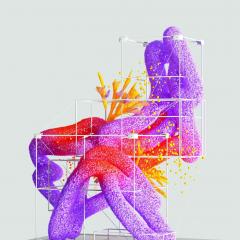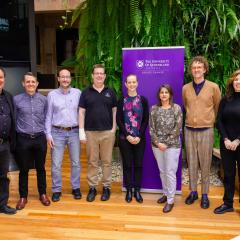AI has been around since the 1950s, but the past year has been transformative in the AI space as generative AI has come into the mainstream. It’s never been easier for people to engage with powerful AI tools, and AI is already deeply integrated into our everyday businesses and personal lives through streaming service recommendations, supermarket inventory management, online banking, retail chatbots, and more.
Yet as AI adoption has increased, so too have concerns about limitations in the data sets, bias in training sytems, and the ability for these powerful AI tools to be used maliciously.
Addressing these concerns, the Australian Academy of Technological Sciences and Engineering (ATSE) in partnership with the Australian Institute of Machine Learning (AML) have published a first-of-its-kind report sharing previously unpublished insights from 13 Australian AI leaders, including UQ AI researchers Dr Rocky Chen, Associate Professor Gianluca Demartini, Professor Guido Zuccon, and Professor Shazia Sadiq.
Responsible AI: Your questions answered highlights Australia's unique opportunity to become a global leader in responsible AI. Our nation's existing laws and governance structures, democratic principles, fair-go values, social diversity, and inclination to be early adopters of technology see us well placed to make significant advances in this area. With a cohesive national, government-led AI strategy, Australia can forge a new economic growth area and lead the direction of this critical aspect of AIadvancement.
To achieve this vision, there are a number of areas identified in the report that require focused attention:
- Coordinated national investment bringing universities and industries together to amplify the impact of Australia's world-leading AI researchers. This includes the need to develop a culture of research, innovation and risk-taking to foster a new cohort of Australian innovators to drive our economy forward;
- Workforce upskilling to meet increasing demand for AI literacy in workplaces, and the need to support STEM education and teacher development;
- Development of AI literacy and understanding in the wider community; and
- Clarity on what a responsbile AI future should look like, and what we need to implement now to achieve that, such as responsible data management.
UQ researchers Dr Rocky Chen, Associate Professor Gianluca Demartini, Professor Guido Zuccon, and Professor Shazia Sadiq co-authored a paper included in the report, titled 'Responsible data management: a precursor to responsible AI'. Speaking at the launch of the report, Professor Sadiq commented on the data explosion that has taken place in the past two decades, creating a gigantic resource that only AI can handle.
"The solution is not just throwing AI at the data, but using the data purposefully and systematically. This is something the international thought leader community has termed Data-Centric AI,” said Professor Sadiq. “This is the discipline of systematically engineering the data needed to build a successful (and importantly responsible) AI system.”
As Director of both the ARC Training Centre for Information Resilience (CIRES), and the UQ AI Collaboratory, Professor Sadiq spoke to the impact and opportunities AI presents Australian society, from her perspective as both a researcher and an educator. She shared two examples where AI has enormous potential:
- Using AI-assisted education technology for productivity gains and better student outcomes. The higher education sector contributes over $140 billion annually to the economy with a 1.5 million student population. With increasing class sizes, providing learning resources and feedback that cater to a diverse cohort of learners is getting harder. There are huge productivity gains being realised and great examples of how AI is benefiting educators and learners from creating class syllabus, lesson plans, assessment items, or identifying at risk students and personalising their learning.
- Mobilising SMEs to leverage the opportunities AI presents, and the innovation gains that can be realised. With the upcoming 2032 Olympics, there is a once-in-a-lifetime opportunity for Brisbane to create an ecosystem of business services and products powered by AI, including optimised supply chains, personalised tourism, and even increased capacity to undertake sustainable practices.
“We are at a crossroads of a major shift in how we live, work, and learn alongside AI. If we are serious about bringing Australia to the forefront of AI, it is super important that we move forward collectively with effective partnerships between research, industry, and government.”
For more information about the report, contact the Australian Academy of Technological Sciences and Engineering (ATSE) or the Australian Institute for Machine Learning (AML).
Teaser image: An artist’s illustration of artificial intelligence (AI). This image represents the boundaries set in place to secure safe, accountable biotechnology. It was created by artist Khyati Trehan as part of the Visualising AI project launched by Google DeepMind. Source: unsplash



